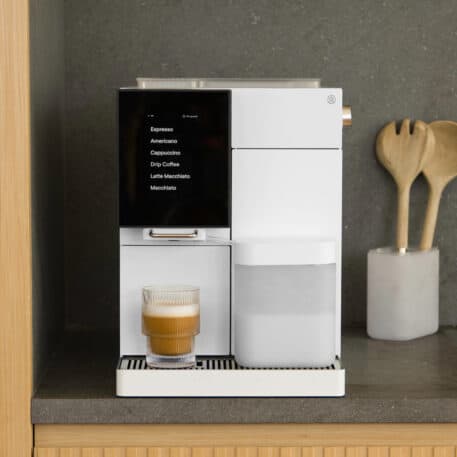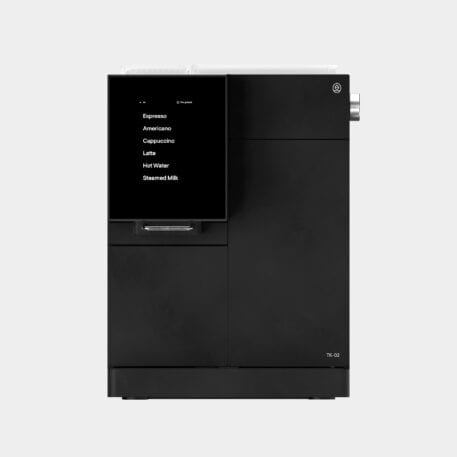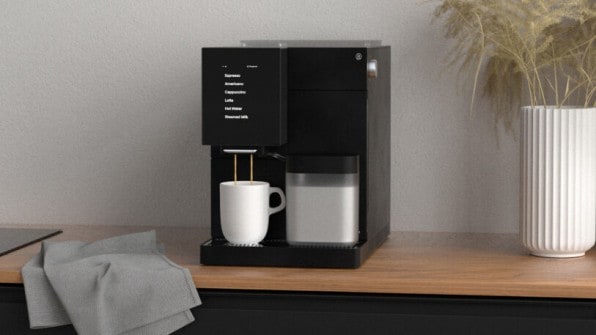On a recent Tuesday morning in New York, Sahand Dilmaghani was drinking an iced latte macchiato—foamed milk topped with a double shot of espresso over a handful of ice cubes. Going for what Dilmaghani says is “a drier, frappe vibe,” the milk was frothed with extra aeration. Poured into an elegant clear glass he showed off on a video call, it was the kind of drink one would find in a hip café, with single-origin beans, minimalist furnishings, and unexpectedly high prices.

But this drink was not made in a café, nor by a barista, but with the push of a button on a compact countertop robot that aims to bring the high-end café experience into customers’ homes. The machine, the TK-02, is the latest product from Dilmaghani’s 4-year-old company, Terra Kaffe. He calls the TK-02 a “super automatic bean-to-cup espresso machine” capable of making everything from a precisely measured espresso shot to a latte macchiato on demand.
The work of industrial designers Ammunition Group, the machine has a touchscreen with tunable controls for grinding, measuring, heating, and brewing beans, and a milk-frothing knob to get that perfect frappe vibe. A cubelike machine about half the size of a microwave, the TK-02 comes in solid white and black steel, with a front-loading milk container, and retails for $ 1,400.

“It basically puts a La Marzocco on your countertop at a fraction of the price and vastly easier user experience,” Dilmaghani says, referencing the café-standard brand that sells its espresso makers for upward of $ 6,000.
But it’s not the high-end commercial espresso machine that Terra Kaffe is competing against. It’s the one-touch simplicity of the pod- and capsule-based coffee machines made by companies like Keurig and Nespresso.
These single-cup coffee makers have exploded in popularity in recent years, partly due to their utter simplicity but also because coffee drinking habits in general have evolved past the traditional 10-cup drip brewer. In 2017, lattes surpassed drip coffee as the most ordered drink in the U.S. “That whole espresso-based beverage category continued to climb,” Dilmaghani says. “The way people were attempting to bring that experience home was with these capsule coffee pod companies, most notably Nespresso.”

Nespresso, a brand owned by Nestlé, generated a reported $ 1.7 billion in sales of its capsules and latte-ready machines globally in the first quarter of 2022 alone.
Following these trends, Dilmaghani launched Terra Kaffe in 2018, and the company’s first coffeemaker, the TK-01, was marketed as providing a more flavorful and customizable step up from the basic one-touch pod and capsule machines. “We were seeing a large portion of people graduating away from those pods to switch over to something that keeps that same ease of use,” he says.
The TK-02 pushes that transition further, offering the simple one-touch experience for a basic cappuccino as well as a highly customizable control system that can grind a shot to a specific granule size, with a weight adjustable down to one-tenth of a gram, and the ability to brew up to the finger-jittering dosage of 16 grams per shot. “We wanted that best of both worlds, where if you wanted to you could just hit a button and get anything from espresso to a cappuccino,” Dilmaghani says. “But we also wanted the quality that you would see in these manual machines, where people were often investing $ 5,000, $ 6,000, $ 7,000 to get multiple pieces of equipment on their countertop.”
The TK-02 is also an internet-enabled device, with an attendant smartphone app—features that may seem like technological overkill for making a cup of coffee. But they’re actually right on point for the very simple and very customizable options Terra Kaffe aims to create. The machine can send messages when beans are running low, or set a time for running its self-cleaning cycle. The app can even upload specific brewing instructions created for the TK-02 by coffee roasters, automatically using their pre-vetted specs on different blends and single-origin roasts.
One major upgrade from the TK-01 is the new model’s ability to brew both espresso shots and basic drip coffee. “We’re recognizing that there’s going to be this immediate need, which is ‘I just want to get up and running and have a cup of coffee,'” Dilmaghani says. “But then there are also a lot of people that want to dig a little deeper and start fine-tuning.”
At $ 1,400, don’t expect the TK-02 to start bumping millions of Keurig coffeemakers off of countertops. But for those ready to leave the overly simple coffeemaking experience for something slightly more elevated, it could be the gateway to a new life as a coffee snob.

